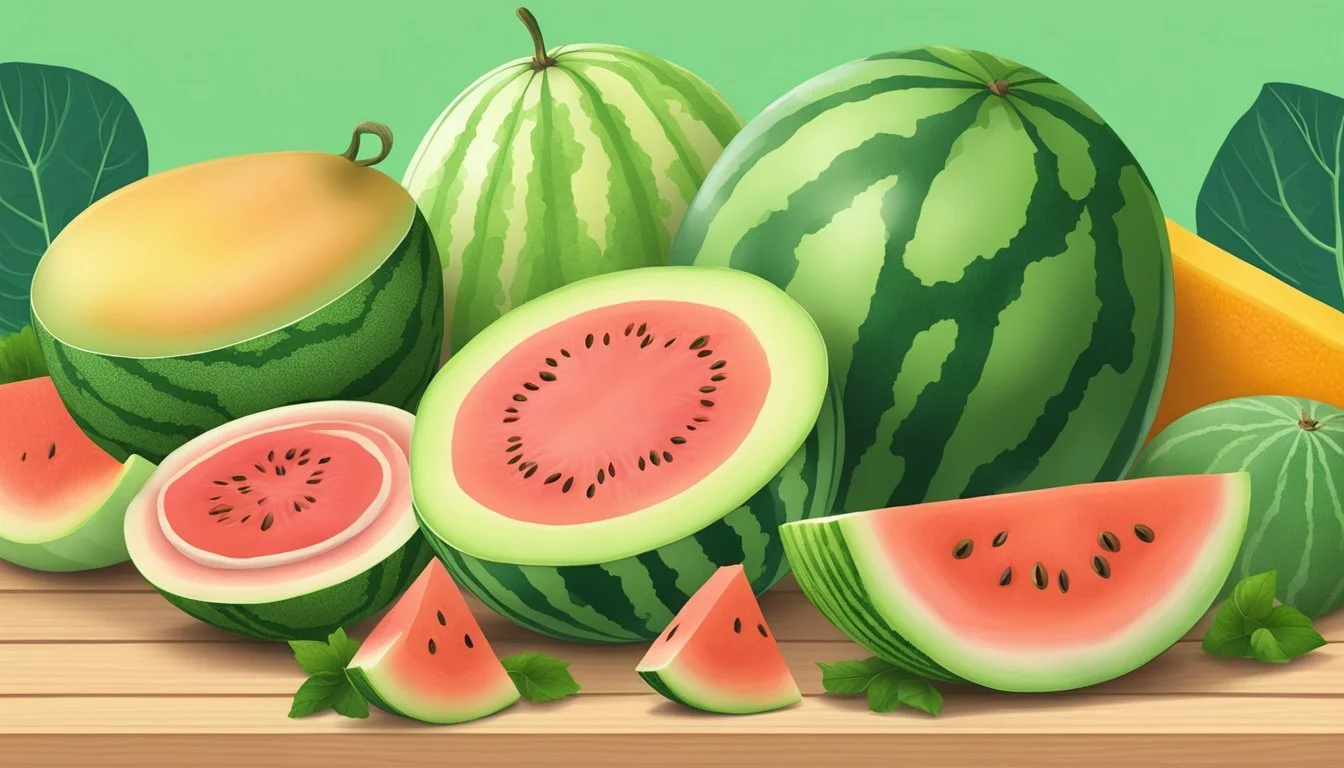Melons Substitutes
Best Alternatives for Your Recipes
For those who love cooking with melons but sometimes find them unavailable or want to try something different, substitutes can be a handy solution. Fuzzy melon, also known as moqua, offers a similar mild flavor and works well in stir-fries and soups, absorbing the taste from other ingredients. This can be a practical alternative in various dishes where winter melon is typically used.
In summer recipes calling for watermelon, options such as honeydew melon, cantaloupe, pineapple, and strawberries can maintain a juicy and sweet profile. These fruits provide similar nutritional benefits and can seamlessly complement salads, smoothies, and desserts.
For those looking to replace cantaloupe, casaba melon, with its distinctively sweet taste and slightly crunchy texture, is a suitable choice. Pineapple also stands out as a versatile substitute, bringing in tropical flavors and a wealth of vitamins and minerals.
Understanding Melons
Melons are versatile fruits that are often consumed fresh or as part of various dishes. They come in various types, each with distinct flavor profiles and nutritional benefits.
Types of Melons
Cantaloupe: Known for its distinct orange flesh, cantaloupe is sweet and aromatic. It is round and often used in salads and desserts.
Honeydew: This melon has pale, green flesh and tends to be sweeter than cantaloupe. Its texture is smooth, making it a favorite for fruit salads.
Watermelon: One of the most popular melons, watermelon has high water content and refreshing flavor. Its flesh is typically red or pink, rich in lycopene.
Winter Melon: Unlike the sweet melons, winter melon has a mild flavor. It's commonly used in soups and stews in Asian cuisine.
Melons Nutrition Profile
Melons are low in calories and high in essential nutrients. They offer numerous health benefits including hydration, due to their high water content.
Vitamins and Minerals: Melons, such as cantaloupe and honeydew, are rich in vitamins A and C, which are vital for eye health and immune function. They also contain potassium which helps maintain healthy blood pressure.
Antioxidants: Watermelon contains lycopene and beta-carotene, effective in fighting free radicals.
Dietary Fiber: Melons offer a decent amount of dietary fiber, aiding in digestion and maintaining stable blood sugar levels.
Other Nutrients: Many melons contain small amounts of iron, which is important for blood health, and citrulline, an amino acid that can improve blood flow.
Selecting Melon Substitutes
When selecting melon substitutes, it’s essential to consider the flavor, texture, and nutritional value. Different substitutes bring distinct characteristics that can best suit various recipes and preferences.
Based on Flavor and Sweetness
Melons like watermelon and honeydew are known for their sweet and refreshing taste. If a honey-like sweetness is desired, mango or pineapple can be excellent choices due to their bold, sweet flavors. Strawberries and berries also provide a touch of sweetness along with a bright aroma. For a milder, less sweet option, guava, pear, or casaba melon may be suitable, capturing some of the subtle notes found in Persian melons.
Considering Texture and Structure
Texture plays a crucial role when selecting melon substitutes. For instance, cantaloupe and honeydew offer a similar soft, juicy texture, making them perfect for salads or fresh consumption. Zucchini and cucuzza provide a more solid texture, ideal for cooking purposes. Watermelon rind can mimic the firm texture needed for certain recipes. For those seeking a smooth, creamy texture, ripe papaya or mango can meet this need, enhancing smoothies and desserts.
Nutritional Considerations
Nutritional content is another factor when choosing a melon substitute. Watermelon is rich in vitamins A and C and provides lycopene, a powerful antioxidant. Pineapple offers similar vitamins along with bromelain, benefiting digestion. Strawberries are high in vitamin C and antioxidants. If calorie-conscious, melons like honeydew can be substituted with pears or berries, which are lower in calories while still packing essential nutrients.
Each substitute brings a unique set of attributes, whether in terms of flavor, texture, or nutrition, ensuring a suitable replacement for various culinary needs.
Culinary Applications of Melons and Their Substitutes
Melons bring a sweet and refreshing flavor to various dishes. When substitutes are needed, ingredients like cucumbers and citrus fruits can mimic these qualities while adding unique benefits themselves.
Refreshing Salads and Sides
Melons such as cantaloupe and honeydew are popular in fruit salads and savory side dishes. Their high water content aids digestion and promotes hydration. Cucumber, a common substitute, offers a similar refreshing quality, enhancing salads with its crisp texture. Adding lime or mint can boost flavor and mimic the lightness of melon.
Using melons or cucumbers in weight loss recipes is effective due to their low calorie and high water content. They can be dressed with citrus syrup and protein, such as cheese or nuts, to improve both taste and nutritional value.
Dessert and Sweet Treats
In desserts, melons provide a natural sweet flavor and are used in dishes like sorbet and fruit parfaits. Their beta-carotene content enhances skin health and protects against sun damage. Substitutes like mangoes or pineapple offer a similarly sweet and juicy profile.
For syrups, jams, and fresh fruit salads, these substitutes excel. Combining these fruits with honey or a dash of lime accentuates their flavors and pairs well with desserts such as yoghurt and sorbet.
Savory Dish Enhancements
Melon can add a sweet and subtle contrast in savory dishes. In garnishes or salads, such as prosciutto with cantaloupe, melons enhance the overall appearance and flavor profile. A common substitute is cucumber, which pairs well with similar savory dishes like cold soup or salads with a light vinaigrette.
Melon salsa is another application where the fruit's sweetness contrasts spicy elements. When melons are unavailable, bell peppers or citrus fruits can replace them, maintaining the bright flavor while adding a unique zesty touch.
Beverages and Cocktails
Melons are often used in cocktails and beverages for their refreshing sweetness. Drinks like melon mojitos or melon agua fresca benefit from the fruit's light and hydrating qualities. In these recipes, cucumber or citrus fruits serve as excellent substitutes, offering a similar refreshing taste.
Combining these substitutes with fresh mint or basil and a hint of lime can replicate the light, summery taste associated with melon-based drinks. These alternatives boost appearance and create a refreshing drink ideal for hot weather.
Melon Varietal Substitutes
Melons can be replaced in recipes with a variety of fruits and vegetables that offer similar textures and flavors. Depending on the type of melon, different substitutes can be used to closely match the desired culinary experience.
Similar to Watermelon
Watermelon substitutes often replicate its watery, sweet flavor and juicy texture. Guava, cactus fruit, red dragon fruit, pear, and pineapple are good options. Guava has a slightly gritty texture, but its flavor can mimic watermelon when combined with other fruits.
Dragon fruit offers a sweet and refreshing flavor, similar to watermelon. Pear provides a crisp texture, while pineapple brings a tangy sweetness that complements many dishes. Other substitutes include strawberries and grapes, which add both sweetness and moisture.
Alternatives to Cantaloupe and Honeydew
Cantaloupe and honeydew have distinctively sweet and fragrant flavors. Peaches and plums can serve as effective substitutes due to their juicy and soft texture. Grapes (specifically, peeled and deseeded) also replicate the sweetness found in these melons.
Galia melon and cucuzza offer similar textures when peeled and cubed. Galia melon, with its aromatic and sweet flavor, closely resembles honeydew, while cucuzza brings a mild taste suitable for salads.
Chayote and zucchini can be used for their firm textures, especially in savory dishes. Fuzzy melon is another alternative—it offers a mild flavor akin to honeydew when cooked.
Unique Melon-like Substitutes
For unique substitutes, bottle gourd and winter melon are excellent choices. Bottle gourd, with its smooth skin and light flavor, is versatile in both savory and sweet dishes. Winter melon has a more neutral taste and can be used cubed or sliced in soups and stews.
Bitter melon provides a crunchy texture and a slightly bitter flavor that becomes milder with cooking. Chayote offers a slightly sweet flavor and firm texture, making it suitable for both raw and cooked dishes.
Finally, using watermelon rind (the white part just beneath the green skin) can replicate the texture of melon in certain recipes after proper preparation and cooking.
Health Benefits of Melons and Alternatives
Melons and their substitutes offer significant health benefits, including hydration, digestion support, weight loss, and improved heart health. These fruits are rich in essential nutrients like potassium, dietary fiber, and vitamin C.
Vital for Hydration and Digestion
Water-rich fruits such as watermelon play a crucial role in maintaining hydration. A cup of watermelon provides around 91.4 grams of water, making it an effective way to boost daily water intake. This high water content helps to keep the digestive system running smoothly.
Honeydew and cantaloupe are also excellent for digestion. These melons contain dietary fiber, which aids in regulating bowel movements and preventing constipation. Additionally, they are rich in vitamins like vitamin C, promoting collagen production and supporting overall skin health.
Substitutes like pineapple and papaya offer similar benefits. Pineapple contains bromelain, an enzyme that aids digestion and reduces inflammation. Papaya is rich in dietary fiber and enzymes that promote digestive health, making them excellent alternatives to melons.
Supporting Weight Loss and Heart Health
Melons are low in calories yet packed with nutrients, making them ideal for weight loss. For instance, a cup of cubed cantaloupe contains just 54 calories. The high water density in these fruits helps one feel full, reducing overall calorie intake.
Rich in potassium, melons help maintain blood pressure levels, which is vital for heart health. Potassium helps relax blood vessels, reducing the risk of heart disease. Additionally, melons' low glycemic load makes them suitable for individuals managing diabetes.
Melon alternatives like strawberries and grapes are also beneficial. Strawberries are low in calories and high in antioxidants, promoting heart health. Grapes contain resveratrol, a compound known for reducing heart disease risk. These fruits provide essential vitamins and minerals, supporting overall cardiovascular health.
Preparing Melons and Substitutes
Proper preparation of melons and their substitutes involves specific cutting and peeling techniques and understanding optimal storage and preservation methods to maintain their sweet flavor and texture.
Cutting and Peeling Techniques
Whether working with watermelon, cantaloupe, honeydew, or substitutes like pineapple and mango, the initial steps are similar. Wash the outer rind thoroughly. For large melons, slice off both ends for stability, then stand it upright and cut downwards to remove the rind.
For mango or pineapple, score the flesh lengthwise and crosswise to create a grid, then scoop out the cubes. To make melon balls, use a melon baller, which can also scoop out cucumbers or pears for elegant presentations. Softer fruits like strawberries and grapes are best cut into halves or quarters using a sharp paring knife.
Storage and Preservation
After cutting, proper storage ensures freshness and sweetness. Place cubes or slices in an airtight container in the fridge. To preserve freshness, add a few tablespoons of lemon juice to prevent oxidation. Melon balls can be stored similarly but tend to have a shorter shelf life.
For long-term storage, consider freezing melon chunks or balls. Lay them on a baking sheet and freeze until firm before transferring to a freezer-safe container. This method works well for both melons and substitutes, making them perfect for use in smoothies or sorbet. Adding syrup or honey before freezing can enhance sweetness and act as a natural preservative.







